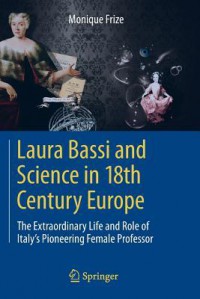Laura Bassi and Science in 18th Century Europe by Monique Frize

This is a lazily researched, poorly-organized and poorly-written book, that nevertheless proved interesting to me by covering the biographies of 18th century female Italian scientists, which I have not found elsewhere. Biographies available in English are overwhelmingly Anglocentric and a historical biography of a non-English speaking woman without an adventurous sex life is a rare find indeed.
But unless you have a strong interest in that subject, you probably shouldn’t read this book. First of all, it’s poorly researched. The author apparently cribbed most of it from the dissertation of a researcher who died prematurely, and that researcher appears to have done much more work on it than this author, who regularly cites to Wikipedia (!). Second, she seems to run out of material about halfway through after already having covered Laura Bassi’s biography and some background on science at the time, so spends the rest of the book summarizing letters Bassi exchanged with various men (unclear why this isn’t simply incorporated into the biography portion) and providing mini-biographies of other Italian women active in science.
Third, the writing is just bad; I think the author is a science professor who is interested in the subject but very much not a writer. She struggles with appropriate prepositions, capitalization, and hyphenation, and there’s frequent awkward sentence structure and word use (words like “obtention” and “embracement”). She also frequently reminds readers of things we’ve already been told, going so far as to use Bassi’s full name and remind us of basic facts such as the city in which she lived well into the book, giving the impression that no final read-through was conducted to streamline the writing. Overall, it’s just rather awkward and jagged.
That said, it definitely is an interesting subject: Laura Bassi was a professor of science in 18th century Italy, which was quite an achievement for a woman at the time, and if the book doesn’t exactly bring her to life, it definitely introduces a lot of facts about her. As it turns out, Italy offered somewhat more opportunities for educated women in the 18th century than other European countries, largely based on the notion of the “exceptional woman,” whose brilliance reflected well on her family and city because since women were assumed to be less intelligent than men, if a woman was that smart, how brilliant must their men be? In general, these “exceptional women” were expected to adorn civic occasions rather than make actual careers, and to be very much the exceptions to the rule: the father of one of them, who had championed his own daughter’s advancement, argued successfully against the same university granting a degree to any other woman on the grounds that it would somehow cheapen his daughter’s achievement. Bassi managed to turn her degree into an actual career though, with some help from unexpected places, namely the Pope, an old friend of hers who wanted to improve the state of science in Bologna at the time.
I would love to see someone write biographies of the women discussed here for a general audience; there’s so much rich material that would be new to most English-speaking readers, and the information included here certainly expanded my understanding of history a little. That said, it is very difficult to recommend this particular book.






 2
2
 3
3